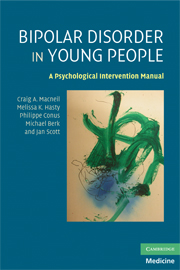Book contents
- Frontmatter
- Contents
- Preface
- Acknowledgements
- Introduction
- 1 Bipolar disorder
- 2 Assessment and engagement
- 3 Insight, adaptation, and functional recovery
- 4 Medication adherence
- 5 Cognitive behavioral therapy interventions
- 6 Social rhythm regulation
- 7 Relationship issues and family work
- 8 Alcohol, substance abuse, and other comorbid disorders
- 9 Identifying early warning signs, preventing relapse, and termination of therapy
- Appendices
- References
- Index
4 - Medication adherence
Published online by Cambridge University Press: 06 July 2010
- Frontmatter
- Contents
- Preface
- Acknowledgements
- Introduction
- 1 Bipolar disorder
- 2 Assessment and engagement
- 3 Insight, adaptation, and functional recovery
- 4 Medication adherence
- 5 Cognitive behavioral therapy interventions
- 6 Social rhythm regulation
- 7 Relationship issues and family work
- 8 Alcohol, substance abuse, and other comorbid disorders
- 9 Identifying early warning signs, preventing relapse, and termination of therapy
- Appendices
- References
- Index
Summary
The major clinical problem in treating manic-depressive illness is not that there are not effective medications – there are – but that patients so often refuse to take them.
Jamison, An Unquiet Mind: A Memoir of Moods and Madness (1995, p. 6)Medication adherence can be a vital component in the treatment of bipolar disorder, as people who are fully adherent are more likely to achieve syndromal recovery than those who are non-adherent or partially adherent (Keck et al., 1998). In addition, adherence with mood stabilizers such as lithium has been found to significantly reduce the likelihood of attempted or completed suicide in people with mood disorders (Muller-Oerlinghausen et al., 1996; Sachs, 2003; Colom et al., 2005).
Conversely, non-adherence with prescribed medication has been found to influence risk of relapse. For example, a review by Colom et al. (2005) noted that rapid discontinuation of lithium was associated with relapse rates of 50% in the 3 months following cessation, compared with less than 10% in people who continued taking prophylactic medication. Furthermore, Strakowski et al. (1998) noted that 60–80% of people admitted to hospital due to a manic episode had been non-adherent in the previous month.
Unfortunately, poor medication adherence is a longstanding problem in bipolar disorder, and continues to represent a significant challenge. In John Cade's (1949) landmark paper, the first case study he reported was a man whose manic symptoms improved significantly with lithium, following which the man returned to work, ceased medication, and relapsed within 6 weeks.
- Type
- Chapter
- Information
- Bipolar Disorder in Young PeopleA Psychological Intervention Manual, pp. 55 - 64Publisher: Cambridge University PressPrint publication year: 2009



